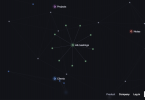This week, a tweet from @Jeanvaljean689 gave me an idea to try in the journal I’ve been keeping in Roam Research since June 2020:
In case you don’t use Roam, here’s a quick explanation of what Jeanvaljean689 was suggesting: in Roam Research, the first time you surround any word or phrase with [[double square brackets]], Roam creates a page with that word or phrase as its title. Visit that page, and you’ll see a list of links back to every other page (and the paragraph, or block, within that page) where you bracketed that phrase … and to every other page (and the blocks within that page) where you’ve used that phrase without linking to it.
One morning, as I was writing in my Roaman Journal about my goals and values, Jeanvaljean689’s tweet came to mind. His “semantic gold mines” struck me as an opportunity to engage in some intensely personal divination — but using my own words instead of the I Ching or Tarot cards. So I typed [[I want]] and followed the resulting link. In less than a second, Roam combed through my daily journal entries since June 27th, 2020, and presented me with a list of 130 unlinked references containing that phrase.
Because these unlinked references were presented as full blocks — entire paragraphs of text, instead of a highlighted word or two — I was quickly able to see how the phrase had been used in multiple contexts. As I read through these blocks, patterns and themes emerged — and one unexpected result devastated me.
What I’ve Told Roam I Want
Here are the top three desires I mention most, in order of frequency:
I WANT TO LIVE A MORE BALANCED, HEALTHIER LIFE.
What I Learned. Eleven percent of all uses of [[I want]] were aspirations to exercise, meditate, and eat healthier more often.
The sobering truth: seeing this forced me to confront how my actions over the past few months (neglecting my daily twenty-minute walk, choosing not to prioritize my daily meditative practice, and eating indiscriminately) are completely out of sync with my desires.
In a dream I had prior to my big weight loss in 2017, an angelic figure once asked me, “Why are you living like someone who wants to die?” Today, Roam Research essentially asked me the same thing.
What I’m Doing about It. Starting today, I’m rebooting my daily weigh in and recommitting to my food logging, meditation, and exercise goals. On December 14th, I’ll start the beginner’s level fitness classes in Apple Fitness+.
I WANT TO DO MORE WITH ROAM RESEARCH.
What I Learned. Roam is one of those tools with far more functionality than anyone will ever fully utilize. That said: I like what I know, and I want to know more. I want to be more of a power user and glean more benefits from my investment in Roam’s development.
What I’m Doing about It. With this goal in mind, I signed up for Cortex Futura’s Galaxy Brain course, and I’m studying on the side to boost my understanding of the new SmartBlocks feature.
I WANT TO BE MORE ENGAGED, FOCUSED, AND PRODUCTIVE.
Nine percent of my [[I want]] aspirations have to do with reducing distraction and enhancing a sense of connection to and engagement with my life. I like waking up with a list of things to achieve. I love embracing a sense of adventure in my work. I want to come closer to being my best possible self … and lately, I realize, I’ve neglected this goal.
Two closely-related aspirations — reclaiming my identity as an author and spending more time reading great books — occurred almost as often.
What I’m Doing about It. I’m recommitting to modest daily reading and writing goals in place, plus restoring weekly publication goals. I’m going to stick to these commitments, even through the hectic, disruptive blitz of the holidays. (If you’re willing to help keep me accountable to these commitments, please feel free to tweet at me and ask, “How’s it going?”)
The Unlinked Reference that Broke My Heart
Near the bottom of the list of unlinked references came the block that hit me hardest of all: a journal entry written during the last week of my mother’s life.
To understand what comes next, you need a little context. For the first seven years Clyde and I were together, my family refused to speak to us. Mother was especially fierce and even spiteful in her rejection, saying and doing things that have proven very hard to forgive.
Over time, Clyde’s gentleness and our commitment to being as loving and present as we could be turned the tide. Eventually, I would joke that Mother liked Clyde more than she ever liked me. (“Mark talks a good game,” Mother would say, “but Clyde can actually do useful things.”) As mother’s illness progressed, Clyde played a special role in her care … and was sometimes the only one who could persuade her to do things that needed to be done.
And this was useful, because Mother complicated her own death, rejecting the drugs and treatments that could have eased the way. Her last days were, in large part, a fog of agony, dementia, and paranoia. Much of the time, she was hostile and hateful toward all of us, even as we struggled to meet her needs.
Moments of lucidity were extremely rare. But my Roaman journal took me back to one such moment: when Mother called Clyde into her room and announced she had something to say. Here’s the block where the [[I want]] phrase occurred:
Mom called Clyde to her bedside. Her brow was furrowed; she kept her eyes closed. But when she knew he was there, she said, “I love you. You didn’t have to do all the things you’ve done for me. And I’m sorry. I’m so sorry. [[I want]]ed to do better, to be better, but there was something in the way … and now I can’t even remember what it was. But I love you just like a son.”
On her deathbed, my mother’s motivations for rejecting us faded from memory, but the regrets from not doing what she ought to have done remained.
What I Want
I want a balanced life. I want to be adept at using the tools I choose. I want to engage with my husband, my family, my friends, my work, and my art … and make things that make a difference.
And because of this exercise, I can see that all the excuses I might cite for not seeking balance, not learning, and not engaging fully with my work and life will eventually fade. If I have the luxury of a death bed, I don’t want to spend a minute regretting that I didn’t become the person I wanted to be.
I’m grateful for Roam Research for being a thoughtful, surprising collaborative partner, and to people like @CortexFutura (Lukas Kawerau) who are dedicated to helping others discover productive uses for this remarkable tool. I’m grateful for @Jeanvaljean689 for the catalyst that spawned these insights. I’m grateful for @tracyplaces for urging me to write this, and for the work she does to raise awareness of the power of Roaman Journals.
What might you discover, I wonder, if you had your own “magic mirror” that could tell you, based on your own words, what you really want?
Photo by Kelly Sikkema on Unsplash







